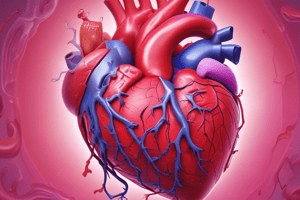Podcast
Questions and Answers
Which of the following is a common trigger for heart failure?
Which of the following is a common trigger for heart failure?
- High cholesterol levels
- Diabetes (correct)
- Low sodium diet
- Regular exercise
What is a primary reason for Left Ventricle Systolic Dysfunction?
What is a primary reason for Left Ventricle Systolic Dysfunction?
- Dehydration
- Coronary artery disease (correct)
- Lack of sleep
- Osteoporosis
Which symptom is commonly associated with heart failure?
Which symptom is commonly associated with heart failure?
- Swollen extremities (correct)
- Increased energy levels
- Decreased heart rate
- Unexplained weight loss
What type of heart failure is characterized by the left ventricle maintaining normal contraction capabilities?
What type of heart failure is characterized by the left ventricle maintaining normal contraction capabilities?
Which condition is NOT a common trigger for heart failure?
Which condition is NOT a common trigger for heart failure?
What is a common symptom of heart failure related to fluid accumulation?
What is a common symptom of heart failure related to fluid accumulation?
How is heart failure typically diagnosed?
How is heart failure typically diagnosed?
Which type of medication is commonly used to optimize heart performance in heart failure patients?
Which type of medication is commonly used to optimize heart performance in heart failure patients?
What is a key nonpharmacological approach to managing heart failure?
What is a key nonpharmacological approach to managing heart failure?
Which diagnostic method allows visualization of heart structure and function in heart failure patients?
Which diagnostic method allows visualization of heart structure and function in heart failure patients?
Flashcards are hidden until you start studying
Study Notes
Understanding Heart Failure
Heart failure (HF) is a complex condition where the heart struggles to pump sufficient blood to satisfy the body's demands, ultimately resulting in diminished functionality. Common triggers involve damage to the heart muscle due to diseases like high blood pressure, coronary artery disease, diabetes, obesity, or genetic influences. Symptoms range from exhaustion to difficulty breathing and include swollen extremities, weight gain, and cough.
Causes
Heart failure encompasses various etiologies depending upon how much blood the heart pumps (ejection fraction) and the type of damage sustained by the heart muscle. Key causes include:
- Left Ventricle Systolic Dysfunction: The left ventricle fails to squeeze effectively (left ventricular systolic dysfunction), notably seen in left ventricular ejection fraction (LVEF) less than 50%. Primary reasons include coronary artery disease, heart attacks, and inherited conditions.
- Right Ventricle Dysfunction: Right ventricle dysfunction typically occurs secondary to left ventricle issues, causing right ventricular systolic dysfunction (RVSD).
- Preserved Left Ventricle Function (HFpEF): Heart failure with preserved ejection fraction (HFpEF) develops when the heart maintains normal contraction capabilities despite having difficulty supplying blood flow to the body.
Symptoms
Symptoms vary between individuals based on the severity of heart failure and the degree of fluid accumulation within bodily tissues. These may manifest as:
- Fatigue, lack of energy
- Shortness of breath, especially during physical exertion or lying down
- Swelling of ankles and feet due to water buildup
- Persistent dry cough, especially at night
- Less frequent urination
- Loss of appetite and nausea
- Rapid or fluttering heartbeats
- Confusion and disorientation, particularly in older adults
Diagnosis
Healthcare providers diagnose heart failure using multiple methods, considering both patient history and test findings. Methods generally employed include:
- Thorough medical interview and physical examinations
- Blood tests
- Electrocardiograms (ECG) for detecting electrical disturbances
- Chest X-rays to assess lung and heart structures
- Transthoracic echocardiography for visualizing heart structure and function
Treatments
Although there is currently no cure for heart failure, appropriate management strategies can enhance longevity, minimize symptoms, and reduce the likelihood of complications. Depending on the severity and stage of the disorder, potential therapies comprise:
- Medications, primarily targeting blood pressure control, reducing fluid retention, and optimizing heart performance
- Angiotensin-converting enzyme (ACE) inhibitors
- Angiotensin receptor blockers (ARBs)
- Beta-adrenergic blockers
- Mineralocorticoid receptor antagonists (MRAs)
- Digoxin
- Sacubitril/valsartan (angiotensin receptor–neprilysin inhibitor; ARNI)
- Nonpharmacological approaches, centering around lifestyle modification
- Regular exercise
- Balanced diet
- Smoking cessation
- Limiting alcohol consumption
- Weight control
- Sleep apnea screening and treatment
While the diagnosis and management of heart failure require specialized expertise, following established guidelines and seeking guidance from healthcare teams can further enhance treatment success and patient outcomes.
Studying That Suits You
Use AI to generate personalized quizzes and flashcards to suit your learning preferences.




